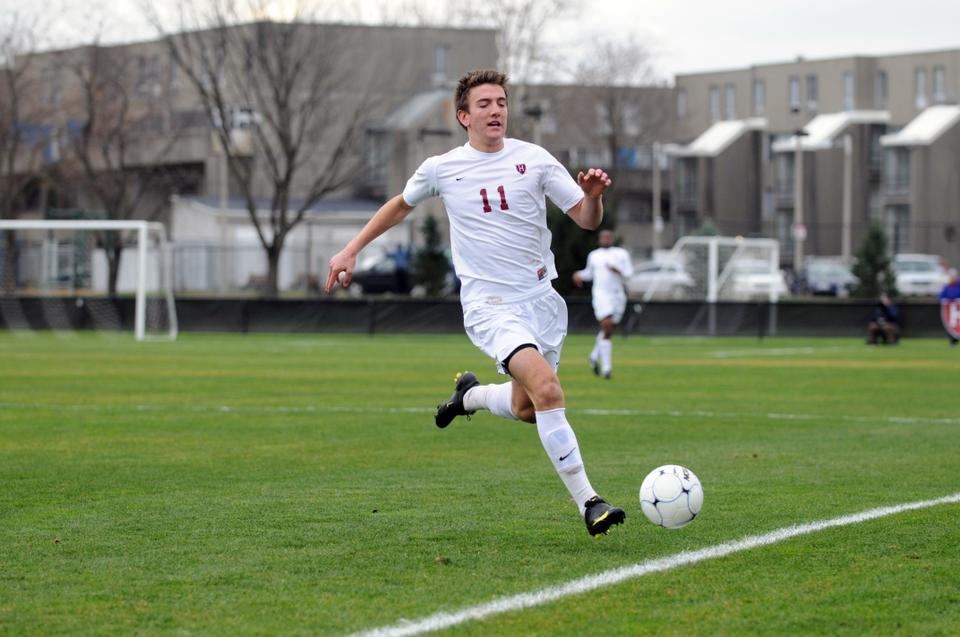
News
When Professors Speak Out, Some Students Stay Quiet. Can Harvard Keep Everyone Talking?

News
Allston Residents, Elected Officials Ask for More Benefits from Harvard’s 10-Year Plan

News
Nobel Laureate Claudia Goldin Warns of Federal Data Misuse at IOP Forum

News
Woman Rescued from Freezing Charles River, Transported to Hospital with Serious Injuries

News
Harvard Researchers Develop New Technology to Map Neural Connections
Early BC Goals Hand Harvard Fourth Straight Loss

NEWTON, Mass.—Despite surrendering two goals in the first half against No. 14 Boston College (9-3, 2-2 ACC), the Harvard men’s soccer team (2-8-1, 0-2 Ivy) may have outplayed its ranked opponent in the first 45 minutes of the match at Newton Campus Field Tuesday afternoon.
And although the Eagles did not score again in the second half, the Crimson believes it did not play up to its full ability in the latter 45, preventing a second-half comeback in its 2-0 loss.
“I didn’t think we had the better of the play in the second half,” Harvard coach Carl Junot said. “We didn’t really create enough opportunities to even put ourselves back in the game.”
Boston College junior midfielder Kyle Bekker put the Eagles on the board early with a fifth-minute goal that Junot called “brilliant.”
Bekker and junior forwards Charlie Rugg and Kevin Mejia passed the ball back and forth before Bekker finally fired a 25-yard curling shot to the right side into the net.
The Crimson responded with two consecutive shots—but no goals. A header by co-captain Tim Linden was saved by Boston College junior goalkeeper Justin Luthy.
Then, seconds later, sophomore forward Connor McCarthy missed wide.
Harvard would outshoot the Eagles, 6-5, in the first half, with six different players taking shots.
But the defense could not contain Bekker, who found the back of the net again in the 41st minute.
This time, he didn’t need assistance from his teammates—his shot deflected off of a Crimson defender and into the goal.
Two goals down at halftime but confident in its first half of play, Harvard hoped to mount more pressure when it retook the field. But the Crimson came out flat, allowing Boston College to dominate possession and take 15 shots to Harvard’s nine for the match.
“From a playing standpoint, we were fairly confident that we could create more shots,” Junot said.
But the confidence did not translate to success, resulting in what the Crimson players recognized as a disappointing final 45 minutes of play.
Harvard bested the Eagles, 2-1, in corner kicks overall, and Austin Harms recorded four saves for the match, but the Crimson’s fall in quality of play ultimately prevented any hope for a second-half comeback.
“The quality definitely dropped in the second half,” said junior forward Brian Rogers, who had two shots in the second frame. “If that happens against a team like BC with that kind of talent, then they can really take it to you, and I think that’s kind of why we had the outcome that we did.”
In the end, it wasn’t Harvard’s first-half deficit that was disappointing for the team, but rather its inability to continue playing at a high level in the second half.
“In the second half, fitness got us a little bit, and I thought Boston College increased their level of play and actually had the better of the play,” Junot said.
Junot was not left searching for answers after the loss.
“If there was a primary factor that changed the game, it was fitness for us,” said Junot, who believes that health and fitness problems prevented the Crimson from maintaining its first-half play later in the game.
This is nothing new for Harvard, which hopes to build on the positives from the loss against the Eagles before it resumes Ivy League play against Brown on Saturday.
“I thought we played a good first half,” Rogers said. “But as has been our problem the whole year, we didn’t put a full 90-minute performance in.”
The game has likely reinforced a valuable lesson for the Crimson: consistent play throughout the game is crucial to the team’s success.
“This was just a momentum game,” Rogers said. “We know our season will be decided by the Ivy League [games], but we can take what we did in the first half against one of the top teams in the country, that we can go blow for blow with them.”
The game also drew attention to an issue that has plagued Harvard all season, but once solved, will allow the Crimson to enjoy the success it briefly had a glimpse of during the first half on Tuesday.
“If we can improve on our fitness, we’re good enough to stay in contention with any team in the country,” Rogers said.
Want to keep up with breaking news? Subscribe to our email newsletter.
